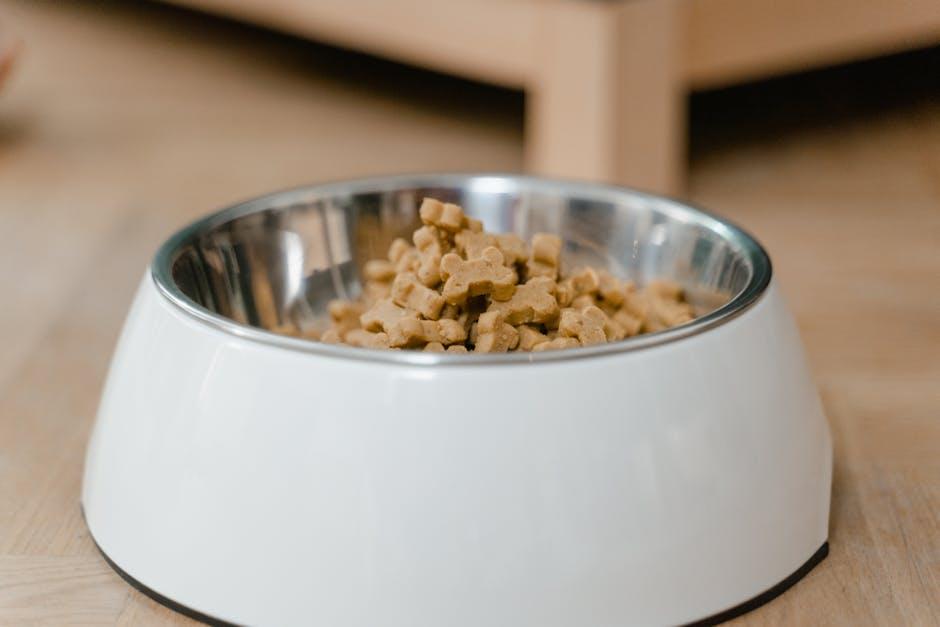Welcoming a new puppy into your home is an exciting and joyful experience, filled with wagging tails and playful antics. As you embark on this heartwarming journey, it’s essential to lay the foundation for a healthy and happy life for your furry friend. One of the most crucial aspects of puppy care is nutrition. Just like human babies, puppies require a balanced and nutrient-rich diet to support their rapid growth and development. In “,” we’ll guide you through the essentials of feeding your puppy, ensuring they receive the nourishment they need to thrive. From understanding the importance of proteins and fats to recognizing the role of vitamins and minerals, this article will equip you with the knowledge to make informed decisions about your puppy’s diet. Let’s embark on this nutritional journey together, setting the stage for a lifetime of health and happiness for your new companion.
Choosing the Right Puppy Food: A Guide to Essential Nutrients
When it comes to feeding your puppy, ensuring they receive the right balance of nutrients is crucial for their growth and development. Puppies have unique dietary needs that differ from adult dogs, and understanding these requirements can set your furry friend on a path to a healthy life. Here are some essential nutrients to look for in quality puppy food:
- Protein: Essential for building strong muscles and tissues, look for foods with high-quality protein sources like chicken, beef, or fish.
- Fats: Provide energy and support brain development. Omega-3 and Omega-6 fatty acids are particularly beneficial.
- Carbohydrates: Offer a quick source of energy. Opt for whole grains and vegetables for a balanced diet.
- Vitamins and Minerals: Vital for overall health, including immune function and bone development. Ensure the food contains adequate levels of calcium, phosphorus, and vitamins A, C, and E.
It’s important to choose a diet specifically formulated for puppies, as these are designed to meet their nutritional demands during this critical stage of life. Consult your veterinarian for recommendations tailored to your puppy’s breed, size, and health needs, ensuring they thrive as they grow.
Understanding Feeding Schedules: When and How Much to Feed Your Puppy
Creating a balanced feeding schedule is essential for your puppy’s health and growth. Puppies typically need to eat more frequently than adult dogs due to their smaller stomachs and higher energy requirements. Most experts recommend feeding young pups three to four times a day until they reach six months of age. After six months, you can gradually transition to two meals per day. This consistent routine not only helps in digestion but also establishes a sense of security for your furry friend.
- 0-12 Weeks: Four meals a day.
- 3-6 Months: Three meals a day.
- 6-12 Months: Two meals a day.
When determining how much to feed, consider factors like breed, age, and activity level. Use the guidelines provided on your puppy food packaging as a starting point, and adjust as necessary. It’s important to monitor your puppy’s weight and growth, consulting with your vet to ensure they’re on the right track. Remember, each puppy is unique, and their nutritional needs may vary. Keep an eye on their energy levels, coat condition, and stool quality as indicators of their overall well-being.
Avoiding Common Pitfalls: Foods and Ingredients to Keep Away from Your Puppy
As you embark on the delightful journey of raising a puppy, it’s essential to be mindful of the foods and ingredients that can be harmful to their health. Puppies have delicate digestive systems and certain common household foods can pose serious risks. To ensure your furry friend’s safety, here are some items to keep out of their reach:
- Chocolate: Even in small amounts, chocolate can be toxic to dogs. Theobromine, a compound found in chocolate, is particularly dangerous and can lead to severe health issues.
- Grapes and Raisins: These fruits may seem harmless, but they can cause kidney failure in dogs. It’s best to avoid them altogether.
- Onions and Garlic: While these ingredients are staples in many kitchens, they can damage a puppy’s red blood cells, leading to anemia.
- Xylitol: Often found in sugar-free gum and candies, this artificial sweetener can cause a rapid insulin release, resulting in hypoglycemia (low blood sugar) and even liver failure.
- Alcohol: Keep all forms of alcohol far away from your puppy. Even small amounts can lead to intoxication, sickness, and in severe cases, coma or death.
Ensuring that these items are not part of your puppy’s diet will help maintain their health and prevent unwanted emergencies. Remember, when in doubt, always consult your veterinarian to keep your puppy’s well-being at the forefront of your care routine.
Supporting Healthy Growth: Supplements and Treats for Your Growing Pup
Ensuring your pup receives the right nutrients is essential for their development and well-being. While a balanced diet is fundamental, supplements and treats can play a supportive role in fostering healthy growth. Puppy-specific supplements can be a beneficial addition, particularly for breeds with unique needs. Look for products that include:
- Omega-3 fatty acids: Promote a shiny coat and support brain development.
- Calcium and phosphorus: Essential for strong bones and teeth.
- Probiotics: Aid in digestion and help maintain a healthy gut flora.
When it comes to treats, they should not only be delicious but also nutritious. Opt for high-quality treats that offer benefits beyond mere taste. Consider options that contain:
- Lean proteins: Support muscle growth and repair.
- Antioxidants: Help in boosting the immune system.
- Natural ingredients: Minimize the risk of allergies and sensitivities.
Remember, moderation is key. Treats should not exceed 10% of your puppy’s daily caloric intake. Always consult with your veterinarian before introducing new supplements to ensure they align with your pup’s specific needs and health conditions.

